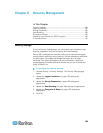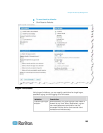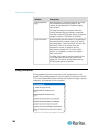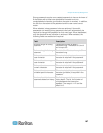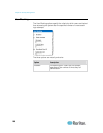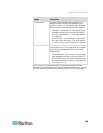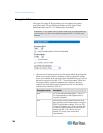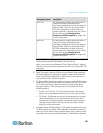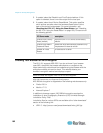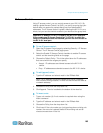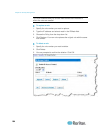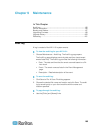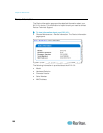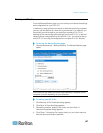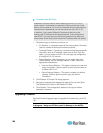
Chapter 8: Security Management
191
Encryption mode Description
AES-128 The Advanced Encryption Standard (AES) is
a National Institute of Standards and
Technology specification for the encryption of
electronic data. 128 is the key length. When
AES-128 is specified, be certain that your
browser supports it, otherwise you will not be
able to connect. See Checking Your
Browser for AES Encryption (on page 192)
for more information.
AES-256 The Advanced Encryption Standard (AES) is
a National Institute of Standards and
Technology specification for the encryption of
electronic data. 256 is the key length. When
AES-256 is specified, be certain that your
browser supports it, otherwise you will not be
able to connect. See Checking Your
Browser for AES Encryption (on page 192)
for more information.
Note: MPC will always negotiate to the highest encryption and will
match the Encryption Mode setting if not set to Auto.
Note: If you are running Windows XP with Service Pack 2, Internet
Explorer 7 cannot connect remotely to the KX II-101 using AES-128
encryption.
2. Apply Encryption Mode to KVM and Virtual Media. When selected,
this option applies the selected encryption mode to both KVM and
virtual media. After authentication, KVM and virtual media data is
also transferred with 128-bit encryption.
3. PC Share Mode. Determines global concurrent remote KVM access,
enabling up to eight remote users to simultaneously log into one KX
II-101 and concurrently view and control the same target server
through the device. Click the drop-down list to select one of the
following options:
Private - No PC share. This is the default mode. Each target
server can be accessed exclusively by only one user at a time.
PC-Share - KVM target servers can be accessed by up to eight
users (administrator or non-administrator) at one time. Each
remote user has equal keyboard and mouse control, however,
note that uneven control will occur if one user does not stop
typing or moving the mouse.
4. If needed, select VM Share Mode. This option is enabled only when
PC-Share mode is enabled. When selected, this option permits the
sharing of virtual media among multiple users, that is, several users
can access the same virtual media session. The default is disabled.




